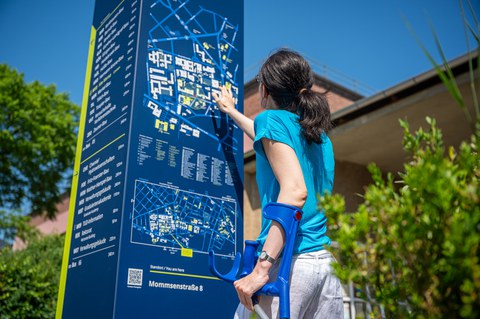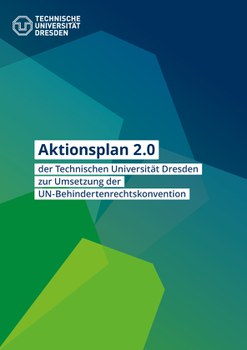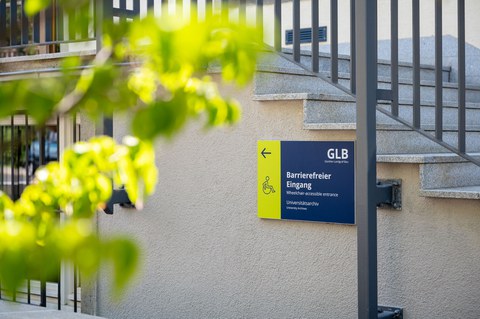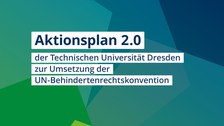Aktionsplan 2.0 der TU Dresden zur Umsetzung der UN-BRK
Inklusion an der TU Dresden bedeutet die Anerkennung und Wertschätzung der Vielfalt aller Studierenden und Beschäftigten – eine faire, diskriminierungsfreie und selbstbestimmte Teilhabe aller.

© Crispin-Iven Mokry

© panthermedia.net / belchonock

© Crispin-Iven Mokry

© Crispin-Iven Mokry

© TU Dresden

© Michael Kretzschmar

© Crispin-Iven Mokry

© PantherMedia / Andriy Popov

© Crispin-Iven Mokry
Um diese Entwicklung nachhaltig zu befördern und auszubauen, ist ein universitätsweit wirkender, strategischer Aktionsplan im Themenfeld Inklusion von Menschen mit Behinderungen und chronischen Erkrankungen ein notwendiges Instrument.
- bestehende Angebote werden erfasst, überprüft und ggf. angepasst,
- (weitere) Handlungsbedarfe identifiziert,
- zukünftige gesamtuniversitäre Ziele formuliert,
- und geeignete Maßnahmen hierfür abgeleitet.
Im November 2022 wurde durch das Rektorat der Aktionsplan 2.0 der TU Dresden zur Umsetzung der UN-BRK beschlossen.
Die Entwicklung des Aktionsplans 2.0
Als erste sächsische Hochschule veröffentlichte die TU Dresden im Jahr 2017 ihren ersten Aktionsplan. Das Deutsche Institut für Menschenrechte hob in ihrer Analyse zu zehn Jahren UN-Behindertenrechtskonvention insbesondere die hohe Verbindlichkeit dieses Aktionsplans sowie die große Beteiligung verschiedener Akteur:innen der TU Dresden bei dessen Erarbeitung hervor und bezeichnet ihn als vorbildlich. (Deutsches Institut für Menschenrechte, 2019, S. 35/36).
Die Umsetzung und Verwirklichung der gesetzten Ziele und der daraus abgeleiteten Maßnahmen sind eine langfristige gesamtuniversitäre Aufgabe. Daher bedarf der Aktionsplan einer stetigen Fortschreibung und Überprüfung der Zielerreichung. Dieser Ansatz wurde auch in der vorliegenden Fortschreibung des neuen Aktionsplanes umgesetzt und weiterentwickelt.
Der Aktionsplan 2.0 der TU Dresden zur Umsetzung der UN-BRK zeigt neben den Angeboten im Themenfeld Inklusion anhand der 6 Handlungsfelder auch bisherige Good-Practice in diesen Bereichen sowie die zentrale Zielsetzung in jedem Handlungsfeld:
- Handlungsfeld bauliche und digitale Barrierefreiheit
Zentrale Zielsetzung: Bauliche und digitale Barrieren wurden identifiziert und schrittweise abgebaut. Die Entstehung neuer Barrieren wurde weitestgehend verhindert. - Handlungsfeld Beschäftigung
Zentrale Zielsetzung: Die TU Dresden hat die Zahl der Beschäftigten mit Behinderung und chronischer Erkrankung erhöht und die Teilhabe von Menschen mit Behinderung weiterbefördert. - Handlungsfeld Qualitätsmanagement
Zentrale Zielsetzung: In einem ganzheitlichen Qualitätsmanagement wurden Instrumente zur Qualitätssicherung inklusiver Lern- und Arbeitsbedingungen an der TU Dresden implementiert und befinden sich in einer stetigen Weiterentwicklung. - Handlungsfeld Lehre und Forschung
Zentrale Zielsetzung: Die TU Dresden hat gezielt die Sichtbarkeit des Themas Inklusion innerhalb der Forschungsprojekte erhöht. Gleichzeitig wurde das Thema stärker in die Forschung eingebracht und damit die Interdisziplinarität sowie das Bewusstsein dafür gefördert. Wissenschaftler:innen mit Behinderung und chronischer Erkrankung in der Qualifizierungsphase oder in der Postdoc-Phase werden gezielt gefördert. - Handlungsfeld Studium
Zentrale Zielsetzung: Die TU Dresden gewährleistet einen niedrigschwelligen Zu- und Übergang in die Studien-, Graduierten- und Beschäftigungsphase. Für Menschen mit Behinderung und chronischer Erkrankung wurden der Studien- bzw. Graduiertenverlauf erleichtert und die Anzahl erfolgreicher Studienabschlüsse erhöht. - Handlungsfeld Awareness und Kommunikation
Zentrale Zielsetzung: Die TU Dresden stellt eine chancengerechte Teilhabe aller sicher, indem Barrieren in den Kommunikationsstrukturen abgebaut wurden und für das Thema Inklusion sensibilisiert wurde. Weiterhin kommt sie der Verpflichtung öffentlicher Institutionen nach, Informationen verständlich und klar bereitzustellen. Diese sind für Menschen mit kognitiven Beeinträchtigungen oder Menschen mit nichtdeutscher Erstsprache leicht zugänglich.
Gern können Sie Druckexemplare der Diversity-Strategie 2030, des Gleichstellungskonzepts sowie des Aktionsplans 2.0 der TU Dresden zur Umsetzung der UN BRK bestellen.
Bitte schreiben Sie hierzu das gewünschte Dokument bzw. die gewünschten Dokumente sowie die entsprechende Anzahl an diversity.management@tu-dresden.de









